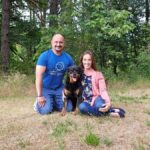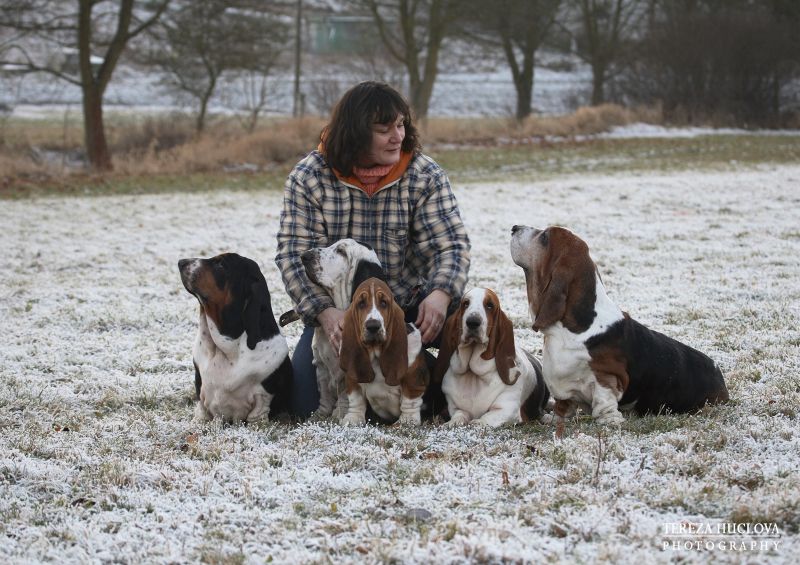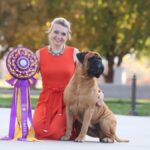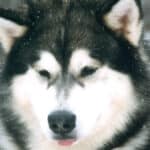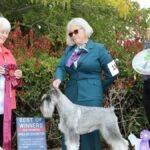Interview with Jana Pašková, Breeder of Grand Grades
Where do I live? How many years in dogs? How many years as a breeder?
I live in the center of Europe, in the Czech Republic. The Basset Hound breed has accompanied me in my life for 35 years. This year marks 22 years since the birth of the first puppies in my kennel.
What is my kennel name? How many dogs do I currently keep?
My kennel is called Grand Grades. I now have six bitches, and that’s my maximum. I will never have more. Two of them are older and resting, two are still young, and two are of reproductive age. All bitches are from my breeding; the two young ones are already sixth generation Grand Grades. All of my bitches are loved and are members of my family. I don’t keep male dogs and I don’t even think about it.
Which show dogs from the past have been my noteworthy winners?
At World Shows, two of my females have been Class Winners in the past; “Ginny” and her daughter, “Janette.” All bitches on my property are multi-champions. Janette is perhaps the best of my bitches, for her fantastic movement.
Which have been my most influential sires and dams?
My third generation bitch, C.I.B., C.I.E, MCH Daya Grand Grades, is in the pedigree of all my current bitches. She was exceptional for me, and my breeding is based on her.
Can I talk a bit about my facilities? Where are my puppies whelped? How are they raised?
All of my dogs live with me in my house where they have one room only for themselves, but they often move elsewhere in the house (on couches). The box with the puppies is in my bedroom until they are about three weeks old. Then the puppies get a bigger playpen, and when the weather is nice, they are also outside during the day. I devote all the time I have to my puppies. All puppies of my breeding are excellently socialized before going to their new homes.
What is my “process” for selecting Show Puppies? Performance Puppies?
Everything starts with choosing a suitable male for my bitch. I have been planning for a long time, and I often go abroad with my bitch for mating. I carefully study pedigrees and search the Internet for information about individuals in the family tree that I do not know. I usually choose a male that I know personally. I know his parents and offspring, and he is close in type, exterior, and character to what I imagine as an ideal. And health tests are also very important to me. Choosing a puppy for exhibition and breeding is not difficult for me. I will only sell puppies to breeders that I would keep for my own breeding.
Do I compete in Companion Events? Performance Events?
All bitches in my breeding have hunting titles. Most of them are also with a CACT working title. One of the females is a Working Champion. This year, I would like to complete this degree with Janette. (She must have 3x CACT; she has 2x so far.)
Is “performance” part of my decision-making when it comes to breeding?
Yes, I consider verification of hunting characteristics important. It is not, however, my strict condition for using a male for breeding. I work with my bitches for fun. I enjoy it and they are excited too. Together we will pass the tests to verify hunting characteristics, but in practice, I do not use my bitches for hunting.
How would I define “conditioning” as it relates to my breed?
The Basset Hound must not be too heavy, must not have a large amount of loose skin, and must move easily. In Europe, it is sometimes possible to see these too-heavy individuals. The Basset Hound is originally a hunting breed. It must look so that it can move easily in the field.
Are there any health-related concerns in my breed? Any special nutritional needs?
Puppies are very demanding on proper nutrition for correct growth and development. Bad and unbalanced feeding can cause serious growth problems, especially in the front limbs. It is necessary to watch over a puppy carefully during its growth, and above all, not to burden it too much with long walks, climbing stairs, and jumping from a height. Some Bassets may be prone to skin problems.
Some genetic diseases must also be monitored in Bassets. These are, for example, POAG, Lafora, thrombopathy, MPS1, and others.
Do I think my breed is supported by a sufficient number of preservation breeders?
In Europe, the Basset Hound is not among the most popular of breeds. Rather, it is one of the less popular dog breeds. The population is sufficiently diverse, however, due to the cooperation of the best breeders from different states.
Is my breed well suited to be a family dog? Who are the best candidates to own my breed?
The Basset Hound is the best family dog. They love everyone, including small children, and are never aggressive towards people or other animals.
What is the biggest misconception about my breed? What is my breed’s best-kept secret?
A lot of people think that the Basset Hound is a fat, lazy, and somewhat stupid dog that wants to spend its life on the couch. It’s not true. The Basset is a dog with a big heart full of love, and is a gentle and calm companion. But the Basset can also handle active walks, hunting, and other activities that their owners invent for them.
If I could share a comment or two with judges of my breed, what would I like to say to them?
World and European shows are usually judged by specialist judges who know our breed perfectly. Sometimes, at some international exhibitions, judges judge for all breeds, where it is very clear that they have not read the Breed Standard for our breed in a long time and cannot judge it well. My message is: “Hey, read the Standard; the Standard has changed in recent years.“
Do I have any words of wisdom to pass along to newer breeders?
The breeder must have his own breeding goal towards which he is aiming. He must strive to ensure that each next generation of his breeding is of the same quality or better than the previous one. They have to study pedigrees, look for information, and think about mating breeding pairs. In addition to the exterior, you also need to watch the character (aggression or timidity), and the most important thing is to monitor the health of our breed.
For a bit of fun, what’s the most amusing thing I’ve ever experienced with a Hound?
My life with Bassets is one big fun. They try to look dignified, but they are clowns. Dignity disappears the moment they see anything that can be eaten or smell anything foul-smelling that they can lie down in.
Are you looking for a Basset Hound puppy?
The best way to ensure a long and happy relationship with a purebred dog is to purchase one from a responsible breeder. Not sure where to begin finding a breeder?
Contact the National Parent Club’s Breeder Referral person, which you can find on the AKC Breeder Referral Contacts page.
Want to help rescue and re-home a Basset Hound dog?
Did you know nearly every recognized AKC purebred has a dedicated rescue group? Find your new best friend on the AKC Rescue Network Listing.
Basset Hound Breed Magazine
Showsight Magazine is the only publication to offer dedicated Digital Breed Magazines for ALL recognized AKC Breeds.
Read and learn more about the Basset Hound dog breed with articles and information in our Basset Hound Breed Magazine.
Error embedding FlippingBook shortcode, please check the flipbook url. (https://digital.showsightmagazine.com/view/751318/)
If you enjoy the Basset Hound Breed Magazine, help us educate the community by sharing it.
